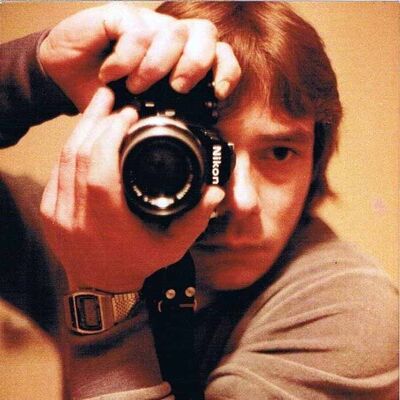Lenses
Jan 30, 2016 05:38:31 #
Jan 30, 2016 05:53:22 #
Grand wrote:
Can u use a fx lens on a Corp sencer?
Assume you meant to type "crop sensor". The simple answer is yes, you can use Fx lenses on a Dx body.
Jan 30, 2016 06:11:21 #
Grand wrote:
Can u use a fx lens on a Corp sencer?
RTFM
Yes. Many people buy ONLY FX lenses for DX Nikons, because they intend to upgrade to a full frame body some day.
DX lenses are designed precisely for DX sensors and FX lenses are designed for FX sensors (meaning the image circle projected by the lens is larger for FX). BUT, you can crop the center from an FX lens' image circle. That's how the term "crop sensor camera" came to be...
The original digital cameras were ALL crop sensor cameras... Basically, they were heavily modified 35mm SLR cameras. The thinking behind THAT was to preserve existing customers' investments in lenses. But it was difficult or impossible or too expensive to make sensors big enough to cover the full 24x36mm "full" frame in those cameras, so they just centered a smaller one.
One advantage is that some performance parameters of a lens are better in the center than at the edge, meaning coma, astigmatism, chromatic aberrations, distortion, and vignetting are all reduced in the center. BUT, the disadvantage is that you're magnifying when you print or display the image, so *effective* resolution is actually reduced.
Those are all finer points. The economically sensible thing to do, if you plan to upgrade to a full frame/FX body, is to buy the best FX lenses you can afford. It's a short term compromise for longer term efficiency.
If you need to maximize quality on DX, though, you need to stick with DX lenses. They are smaller, lighter, less costly, and easier to manufacture to high tolerances and performance standards for that format. HOWEVER, there are exceptions! A very expensive FX lens will sometimes outperform a very inexpensive DX lens on a DX body.
The same is true on Canon where they make APS-C size and full frame bodies.
You can also use full frame (FX) lenses on Micro Four-Thirds cameras, with adapters. However, because the magnification is 2X, rather than 1.5X, the reduction in resolution starts to rear its ugly head. MetaBones makes a (very expensive) product to relieve this problem. It's called the SpeedBooster, and it reduces the size of the image circle, intensifies the light, and improves lens performance by doing so. It also reduces the crop (widens the field of view).
Jan 30, 2016 07:04:59 #
most times you can. I shoot sony, and have only one fx body and four dt/dx bodys.i have 3 sony dt/dx lenses. the rest are Minolta fx lenses, so far so good.
I alst shoot pentax medium format, 645d is dx to 645 films fx, i'm only using lenses from the film era. so far so good.
I alst shoot pentax medium format, 645d is dx to 645 films fx, i'm only using lenses from the film era. so far so good.
Jan 30, 2016 07:21:22 #
burkphoto wrote:
RTFM br br Yes. Many people buy ONLY FX lenses fo... (show quote)
Interesting. Tell me if I'm wrong, as I've always assumed, the difference in resolution of an FX lens on a DX camera would be the same as the crop factor, or roughly the same as the equivalent of one print size which is also about the same as the crop factor (all things being equal).
Jan 30, 2016 08:44:55 #
Blasthoff wrote:
Interesting. Tell me if I'm wrong, as I've always assumed, the difference in resolution of an FX lens on a DX camera would be the same as the crop factor, or roughly the same as the equivalent of one print size which is also about the same as the crop factor (all things being equal).
if you are not doing really big prints, it should not be a big deal.
Jan 30, 2016 08:48:37 #
Jan 30, 2016 09:51:31 #
A question on this same subject; Is it true a FX lens on a DX body cannot autofocus because the motor is in the full frame camera, not the lens?
Jan 30, 2016 10:01:59 #
Tpharm wrote:
A question on this same subject; Is it true a FX lens on a DX body cannot autofocus because the motor is in the full frame camera, not the lens?
It depends on the lens used. In Nikon speak if the lens is AF it usually needs the in camera focus motor. If it is AF-S it has it's own focus motor. Not sure what the designator is on a Canon lens as far as internal focus motor.
Jan 30, 2016 10:45:20 #
jethro779 wrote:
It depends on the lens used. In Nikon speak if the lens is AF it usually needs the in camera focus motor. If it is AF-S it has it's own focus motor. Not sure what the designator is on a Canon lens as far as internal focus motor.
Thank You, Important to know
Jan 30, 2016 10:49:10 #
Jan 30, 2016 11:45:49 #
Grand
Loc: Lebanon, Pa
bcmink wrote:
Assume you meant to type "crop sensor". The simple answer is yes, you can use Fx lenses on a Dx body.
Thank you.
Jan 30, 2016 11:46:25 #
Jan 30, 2016 11:50:54 #
There is an ADVANTAGE to shooting an FX lens on a DX body. As the FX lens has a larger image circle to cover the larger format, the DX sensor "sees" only the central area of that larger image circle. Therefore, the DX sensor "sees" generally the best portion of that FX lens' performance. At the edges of the image circle the image tends to degrade. This does not happen when shooting an FX lens on a DX body.
There, said it twice just to make the point.
There, said it twice just to make the point.
Jan 30, 2016 12:39:07 #
jethro779 wrote:
It depends on the lens used. In Nikon speak if the lens is AF it usually needs the in camera focus motor. If it is AF-S it has it's own focus motor. Not sure what the designator is on a Canon lens as far as internal focus motor.
Canon doesn't use in-camera focus motors on any of it's DSLRs, either FF or APS-C. All are in the lenses.
If you want to reply, then register here. Registration is free and your account is created instantly, so you can post right away.









